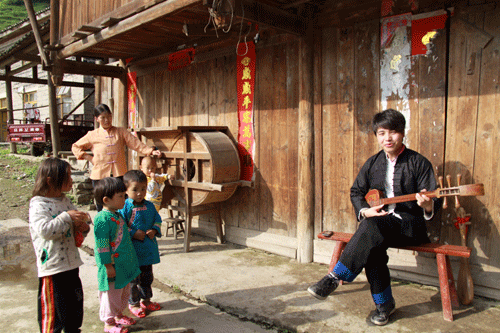Sing for love: young Pipa song promoter
 0 Comment(s)
0 Comment(s) Print
Print E-mail CRI, May 22, 2012
E-mail CRI, May 22, 2012
|
Wu Liangfeng, a popular local musician, singing a Pipa song while playing the Chinese lute, or pipa. It is Dong tradition to pass down these songs to younger generations by singing them to children in a casual way. [CRI Photo] |
The Dong ethnic group from Liping county, in southeastern China's Guizhou province, is well known for its Pipa or Chinese lute, songs. The Dong's music makes up an important part of their daily life, but it has also enjoyed popularity in the region for the last 600 years. The music song is a source of pride for the Dong, with songs about the people's history, farming experience, and customs.
At the entrance of Pingjia Dong Village in Liping county, local villagers usually welcome their guests by performing Pipa songs during a ceremonial ritual. Among the performers, there is a 26-year-old man named Wu Liangfeng.
"I started learning Dong Songs ever since I was able to understand things. My grandma was a veteran musician, and she taught me how to sing when I was little. Back then, the first thing that I did when I came home was to sing a song. My grandma loved Dong songs very much. Even when I got tired of them, she would force me to learn."
Wu recalls that at the end of his Grandma's life, she had forgotten almost everything else, but never forgot a single Dong Song.
From generation to generation, the Dong people have handed these songs down orally. After his grandma passed away, Wu felt obliged to collect the songs he had learnt and record them. Many of the older songs had already been lost, and so Wu dedicated himself to preserving the Dong's music.
"This is the last song she taught me. It's about traditional principles, like how we should be respectful to our parents, how to get along with our brothers. It is the last music my grandma left me."
The more Wu has learned and sung Pipa songs, the more he has come to love them. Wu says, he tries to preserve the song's any way he can. For example, he records some on tapes, and sometimes he writes them down. More importantly, he became a professional singer, promoting the songs nationwide with great passion.
"I started to sing Dong songs publicly when I visited to Guangxi at the age of 11, but I only began to tour when I graduated in 2004. Since then, I have been invited to perform at important occasions such as wedding ceremonies, at the birthdays of elders, house warming parties, and baby showers, etcetera."
Wu tours not only to villages, but also to cities. He says the songs capture the attention of the audience, whether from China or abroad. His performances include beautiful traditional Dong costumes that many people have never seen before.
"At first, we sang in bars, and listeners really enjoyed it because the songs' unique charms. While my fellow villagers are quite familiar with the music, for city dwellers it is very interesting to listen to original music like this, so it is quite popular."
When Wu first began singing and touring, his mother couldn't understand his dedication to the music. In her mind, singing songs, even traditional ones, isn't a career. It's just a pastime. As his family's only breadwinner, Wu shoulders his responsibilities and reassures his mother.
"The most important thing in life is to know what we should do and what we shouldn't. You need to keep in mind that your son isn't foolish. I don't crave fame. I only want to keep something worthwhile for myself while letting other people know our history."
Wu keeps singing Pipa songs, and promotes them nationwide. He says it would be terrible if nobody could sing them anymore because there were no written records, so he carries on with his passion. What's more, Wu's become quite popular with his fans. In a small village in Guangxi province, many senior villagers like his songs so much that they don't want to leave until four in the morning.
"Because they can't understand TV shows, but can understand the Dong Songs, they keep listening until I finish my performance, no matter how late it goes. It's very encouraging and motivating for me. I was touched and wrote a song called "Why I Sing Pipa Songs." I sing it to end my performance each night, and it moves many of them to tears."
In return, villagers offer him their hand-made shoes and cloth. Wu says he still remembers one time he sang for free in a village, and afterwards, the people gave him more than 100 pairs of cloth shoes and 60 to 70 bolts of cloth. He says he gave away most of them to the village elders.
Wu says that now his mother never complains about what he does, because when she visits different places, lots of people praise her son. She is really proud of him, and has begun supporting him because now she completely understands why he sings Pipa songs.







Go to Forum >>0 Comment(s)